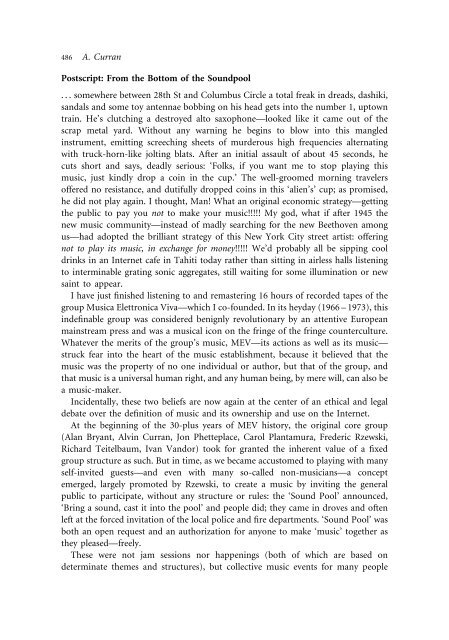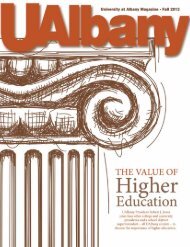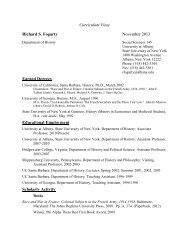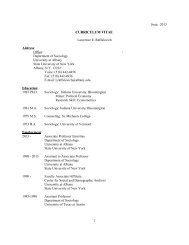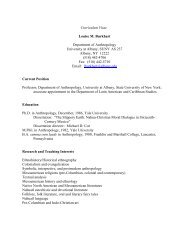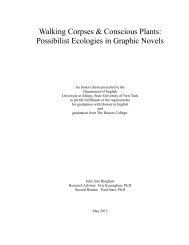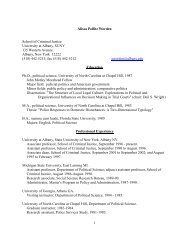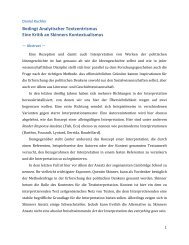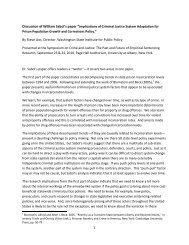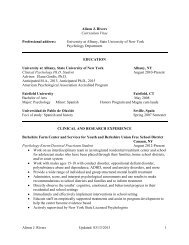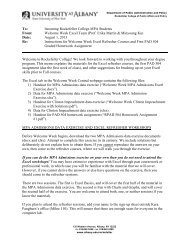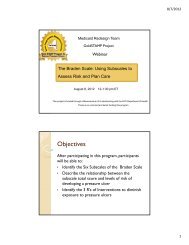Alvin Curran, "On Spontaneous Music" - University at Albany
Alvin Curran, "On Spontaneous Music" - University at Albany
Alvin Curran, "On Spontaneous Music" - University at Albany
You also want an ePaper? Increase the reach of your titles
YUMPU automatically turns print PDFs into web optimized ePapers that Google loves.
486 A. <strong>Curran</strong><br />
Postscript: From the Bottom of the Soundpool<br />
. . . somewhere between 28th St and Columbus Circle a total freak in dreads, dashiki,<br />
sandals and some toy antennae bobbing on his head gets into the number 1, uptown<br />
train. He’s clutching a destroyed alto saxophone—looked like it came out of the<br />
scrap metal yard. Without any warning he begins to blow into this mangled<br />
instrument, emitting screeching sheets of murderous high frequencies altern<strong>at</strong>ing<br />
with truck-horn-like jolting bl<strong>at</strong>s. After an initial assault of about 45 seconds, he<br />
cuts short and says, deadly serious: ‘Folks, if you want me to stop playing this<br />
music, just kindly drop a coin in the cup.’ The well-groomed morning travelers<br />
offered no resistance, and dutifully dropped coins in this ‘alien’s’ cup; as promised,<br />
he did not play again. I thought, Man! Wh<strong>at</strong> an original economic str<strong>at</strong>egy—getting<br />
the public to pay you not to make your music!!!!! My god, wh<strong>at</strong> if after 1945 the<br />
new music community—instead of madly searching for the new Beethoven among<br />
us—had adopted the brilliant str<strong>at</strong>egy of this New York City street artist: offering<br />
not to play its music, in exchange for money!!!!! We’d probably all be sipping cool<br />
drinks in an Internet cafe in Tahiti today r<strong>at</strong>her than sitting in airless halls listening<br />
to interminable gr<strong>at</strong>ing sonic aggreg<strong>at</strong>es, still waiting for some illumin<strong>at</strong>ion or new<br />
saint to appear.<br />
I have just finished listening to and remastering 16 hours of recorded tapes of the<br />
group Musica Elettronica Viva—which I co-founded. In its heyday (1966 – 1973), this<br />
indefinable group was considered benignly revolutionary by an <strong>at</strong>tentive European<br />
mainstream press and was a musical icon on the fringe of the fringe counterculture.<br />
Wh<strong>at</strong>ever the merits of the group’s music, MEV—its actions as well as its music—<br />
struck fear into the heart of the music establishment, because it believed th<strong>at</strong> the<br />
music was the property of no one individual or author, but th<strong>at</strong> of the group, and<br />
th<strong>at</strong> music is a universal human right, and any human being, by mere will, can also be<br />
a music-maker.<br />
Incidentally, these two beliefs are now again <strong>at</strong> the center of an ethical and legal<br />
deb<strong>at</strong>e over the definition of music and its ownership and use on the Internet.<br />
At the beginning of the 30-plus years of MEV history, the original core group<br />
(Alan Bryant, <strong>Alvin</strong> <strong>Curran</strong>, Jon Phetteplace, Carol Plantamura, Frederic Rzewski,<br />
Richard Teitelbaum, Ivan Vandor) took for granted the inherent value of a fixed<br />
group structure as such. But in time, as we became accustomed to playing with many<br />
self-invited guests—and even with many so-called non-musicians—a concept<br />
emerged, largely promoted by Rzewski, to cre<strong>at</strong>e a music by inviting the general<br />
public to particip<strong>at</strong>e, without any structure or rules: the ‘Sound Pool’ announced,<br />
‘Bring a sound, cast it into the pool’ and people did; they came in droves and often<br />
left <strong>at</strong> the forced invit<strong>at</strong>ion of the local police and fire departments. ‘Sound Pool’ was<br />
both an open request and an authoriz<strong>at</strong>ion for anyone to make ‘music’ together as<br />
they pleased—freely.<br />
These were not jam sessions nor happenings (both of which are based on<br />
determin<strong>at</strong>e themes and structures), but collective music events for many people


